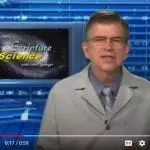[Originally published in 2014 as A Historian Asks: Is it okay to lie about history for a good cause?]
Not too long ago, the Fox network aired a reboot of Cosmos. The first version, Cosmos: A Personal Voyage, was a thirteen-part series hosted by Dr. Carl Sagan. The reboot, Cosmos: A Spacetime Odyssey, was a thirteen-part series hosted by Dr. Neil DeGrasse Tyson. While both series were mostly about science, they each mentioned the history of science from time to time. While I can’t comment on the first series, I can say without a doubt that the new series was spectacularly awful when it came to science history.
It started off badly when the first episode elevated Giordano Bruno to the status of scientific hero and martyr. The problem is that history tells a completely different story. Bruno was a champion of all sorts of strange ideas (such as that Satan would be redeemed by God and that Jesus was a magician, not the Son of God), and when he did discuss science, it was clear he didn’t understand it very well. He ended up being a martyr for magic and the occult, not for science. In addition, the serious natural philosophers of the day, like Kepler and Galileo, opposed Bruno.
Perhaps the worst treatment of science history by the new Cosmos was its discussion of Newton. Dr. Tyson actually claimed
Newton’s laws of gravity and motion revealed how the sun held distant worlds captive. His laws swept away the need for a master clockmaker to explain the precision and beauty of the solar system. Gravity is the clockmaker. [Episode 3: “When Knowledge Conquered Fear”]
Nothing could be further from the truth! In fact, the Master Clockmaker was the reason Newton came up with his Universal Law of Gravitation. Unlike the philosophers of the past, Newton believed that all motion should follow the same basic set of principles. This led to his Universal Law of Gravitation as well as his Laws of Motion. Why did Newton believe this? According to Dr. Morris Kline:1
The thought that all the phenomena of motion should follow from one set of principles might seem grandiose and inordinate, but it occurred very naturally to the religious mathematicians of the 17th century. God had designed the universe, and it was to be expected that all phenomena of nature would follow one master plan. One mind designing a universe would almost surely have employed one set of basic principles to govern related phenomena.
So, rather than sweeping away the need for a Master Clockmaker, the laws he discovered were firmly rooted in the belief that there is a Master Clockmaker.
There are other examples of bad history in the new Cosmos, but that’s not the focus of my post. Instead, I want to discuss one historian’s reaction to the bad history in the television series. Dr. Joseph D. Martin is an assistant professor of history, philosophy, and sociology of science at Michigan State University. In a post entitled, “We need to talk about Cosmos…,” he states:
I’ve been watching with interest as the history of science community, particularly on Twitter, has reacted with consternation to the historical components of Neil deGrasse Tyson’s Cosmos reboot. To a large extent I agree with these criticisms. It is troubling that the forums in which the public gets the most exposure to history of science also tend to be those in which it is the least responsibly represented.
But part of me also wants to play devil’s advocate. First, Cosmos is a fantastic artifact of scientific myth making and as such provides a superb teaching tool when paired with more responsible historical presentations and perhaps some anthropological treatments of similar issues like Sharon Traweeks Beamtimes and Lifetimes.
Second, I don’t know that we, as a community, have adequately made the case that the scholarly view of history we advance is, in fact, more useful for current cultural and political discourse than the naïve view scientists advance. One thing we often see in our research, and parallel work in philosophy of science, is that “right” is often not the same thing as “useful.” I’m interested in generating some discussion in why and how, if at all, we can make the case that “useful” and “right” are and should be the same thing in this case for reasons other than internal professional ones.
That’s a long quote, but read it carefully.
He agrees that the history in Cosmos is bad, but he says that might be okay. After all, the bad history portrayed in the series is “more useful for current cultural and political discourse.” As a result, he wants to have a discussion about whether or not it’s okay to use the “useful” version of history instead of the “right” one. In other words, he is asking whether or not it is okay to lie about history if it helps people believe what you want them to believe!
I could understand this if a politician were writing it. I wouldn’t agree, of course, but I could at least see why a politician would be interested in discussing whether or not it’s okay to lie to support a particular agenda. However, this is an academic historian. An academic historian should be interested in only one thing: uncovering the truth about what happened in the past. Nonsense like the bad history portrayed in Cosmos should be an anathema to him!
The answer to his question is obvious: Of course it’s not right to lie about history, no matter what agenda the lie supports. If a historian really has to ask that question, something is dreadfully wrong!
Reference
- Morris Kline, Mathematics: The Loss of Certainty, Oxford University Press 1980, p. 52.







